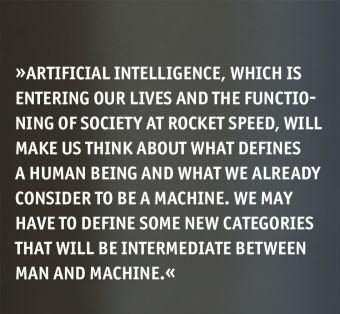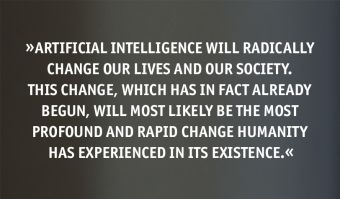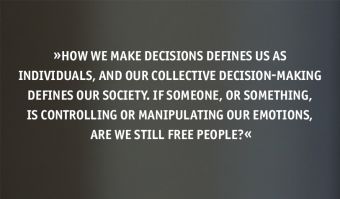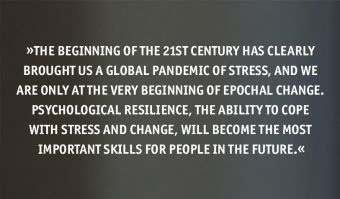
What does it mean to be human in the age of artificial intelligence?
European Commission

What does it mean to be human in the age of artificial intelligence?
Introduction
A friend of mine recently complained that ever since his 14-year-old son Jacob downloaded the new social networking app TikTok, he can’t seem to get away from it. My friend says he hasn’t seen this happen to his son before. What has actually been happening with Jacob and his relationship with the new app? Researcher Jason Davis, who has looked into TikTok in detail, describes it very well. Once Jacob started the app, he didn’t have to define his favourite topics or hobbies. The AI algorithms immediately went to work and started analysing Jacob’s behaviour and his emotions. They figured out what he liked and disliked. What he can stand to look at and what he quickly skips over. They started offering him all sorts of content and soon they knew Jacob better than Jacob knows himself. They knew with incredible precision which videos would engage James and which wouldn’t. What content would evoke a positive or negative emotion in him. And this is exactly what plays the most important role in the new type of economy we call the attention economy. Our time and our attention is of great economic value to digital platforms and their advertising partners, as is knowing our likes and activities.
You might say to yourself, I don’t care because I don’t use TikTok and I’m not going to. It’s just that TikTok is just a small and fairly innocuous illustration of something big and transformative that affects us all. Artificial intelligence will radically change our lives and our society. This change, which has in fact already begun, will most likely be the most profound and rapid change humanity has experienced in its existence. We need to start talking about it. Among experts, politicians, but also ordinary people. This change will affect everyone.
The question in the title of this text, which has been asked by philosophers and religious figures for hundreds, perhaps even thousands of years, does not resonate well with ordinary people. But that is likely to change in the next few years. Artificial intelligence, which is entering our lives and the functioning of society at rocket speed, will make us think about what defines a human being and what we already consider to be a machine. We may have to define some new categories that will be intermediate between man and machine. Artificial intelligence is a technology that is, in fact, for the first time in the history of mankind, entering us directly and has the potential to change not only man, but also the society in which we live. In his book Life 3.0, Max Tegmark calls for a broad discussion about the future of humanity and calls it the most important conversation of our time. But it is not just a discussion for elites. It will have to involve virtually everyone who cares about our future and wants to shape it. It is possible, even likely, that we will see more significant changes over the next ten years than we have seen in the last hundred years. This is well illustrated by this year’s report on neuro-technology by the United Nations Educational, Scientific and Cultural Organisation (UNESCO) Commission on the Ethics of Technology. In this report, the members of the Commission call for a review of fundamental human rights. Human rights were defined more than 70 years ago, primarily as the protection of citizens from dictatorial regimes. According to the authors, this is no longer sufficient and people must also be protected from technologies that have the ability to alter our thinking and enter human consciousness.

Good intentions will not protect us from transformational change
Artificial intelligence is already much better at tasks that are narrowly defined, such as recognising images, graphic patterns, sounds, and processing large data sets. Human intelligence still has the upper hand in a number of cognitive and emotional tasks, in the ability to generalise, or to diametrically change the topics it deals with in a fraction of a second. But how long will this be the case? We don’t quite know yet, but we do know that billions of euros are being invested in the world’s largest laboratories in the development of so-called general artificial intelligence that could match human intelligence on these complex issues. However, one thing is already quite clear. The interconnection and interaction between human and artificial intelligence will become a normal part of our lives. It may not even be necessary to use the future tense, as some hybrid systems already exist today. For example, to compensate for various cognitive disorders, so-called AI-based cognitive enhancers are already being used today. They are designed to treat multiple diagnoses and so Alzheimer’s patients have a good chance of seeing their condition improving soon. But what is to prevent these tools from being used on a large scale for ‚recreational‘ purposes? After all, who wouldn’t want to have a better memory, creativity or learn a foreign language faster?
Until now, humans have used their cognitive abilities based on genetic makeup, or on elaborate methods to support our thinking. This means that even the non-wealthy with good cognitive abilities were able to apply themselves in any place in society. In the future, however, this may not be the case. Technology may create a class of super-humans with abilities hardly comparable to those genetically determined. And we’re still not talking about human-brain-computer interfacing, or brain implants. These are not the fantasy and fiction of novels, but a reality being tested in laboratories and companies today. They can significantly help in the treatment of neurological diseases, but they can also lead to so-called digital immortality, in addition to a special class of super-humans. This means that after physical death, our thoughts, memory, and parts of consciousness will be able to exist in virtual space and become immortal. Are we ready for this? How will this change our society? Coping with the challenges associated with new AI-based technologies will require expanding the traditional dialectic of risks and opportunities and viewing them in a broader societal context.

The struggle for human emotions is becoming the struggle of the 21st century
We passionately debate whether machines can have emotions and if so, what they would look like. What we completely miss is that artificial intelligence algorithms are already much better at decoding and influencing human emotions than we are. Couple this with insights from the behavioural sciences, which show that up to 85% of our decisions are based on emotion, and we can see the breadth and depth of the problem we face. How we make decisions defines us as individuals, and our collective decision-making defines our society. Whether it is making a decision in a free and direct election, deciding to buy a product, deciding on a life partner, or any other of hundreds and thousands of decisions, depends on emotions. If someone, or something, is controlling or manipulating our emotions, are we still free people? Liberal democracy and the free market are essential features of our society. But what happens to them if the free decision-making that underpins them is not free? It will not be free because the emotions that are central to decision-making will be manipulated.
Again, we can fall back on innocent intentions that can lead to problems. In the beginning, there were algorithms whose job is to keep the client engaged as long as possible with some content that is mostly „free“ and thus with the accompanying advertising that someone pays for. Artificial intelligence, which sets the algorithms, is defined as a system capable of observing its surroundings and then making autonomous decisions. Artificial intelligence has observed that negative, hateful, often deceptive content attracts people more, and so it naturally makes the decision to offer controversial content more often in order to keep people’s attention longer. One of the negative, and at the beginning probably unintended, consequences is the spread of untruths and the polarisation of society. It is certainly not the only reason for this unhappy state of affairs, but it is certainly one of the important ones. Another unfortunate impact that nobody expected, and one which we still do not fully understand, and which is most likely linked to the digital transformation, is the explosion of mental illness in children and young people. Over the last decade, this is an increase of between 15% and 25%.

Creativity is no longer just the domain of humans
Years of digitisation of cultural content have led to unprecedented accessibility and personalisation. Today, people can watch cultural content from anywhere and at any time. At the same time, the boundary between the producer of cultural content and its consumer is gradually blurring. Artificial intelligence, which first entered the field of art and culture through personalisation of offerings and preference tracking, is now connecting, reproducing and even creating new artistic products from cultural content—music, visual art and text. At the same time, it opens up completely new horizons for artists and scientists that were unknown to them. The question of whether “machines” will become artists is becoming ever more intense. Some today radically reject it, but in all likelihood we will soon also see in art and science a fusion of the human and the „machine“, produced by artificial intelligence.
Psychological resilience will be key to life with artificial intelligence
The entry of artificial intelligence into society will bring a great deal of change to everyday life and work. Many jobs will disappear, many new ones will be created. We are already seeing a growing momentum of change in work, and this will only accelerate. This will involve the need to change established ways of working and living and to learn new skills much more frequently than has been the case to date. However, change is stressful for people. The beginning of the 21st century has clearly brought us a global pandemic of stress, and we are only at the very beginning of epochal change. Psychological resilience, the ability to cope with stress and change, will become the most important skills for people in the future. Just as we have become accustomed in recent decades to the normality of going to the gym or playing sports and strengthening our bodies, we will quickly have to get used to the need to strengthen our spirits and become psychologically resilient. This will be a shared responsibility between the education system, employers and each person individually. Emotional skills such as empathy, compassion and mindfulness, which are relatively little talked about today, will gradually come to the centre of our attention.
Conclusion
stop it. The benefits of artificial intelligence for humanity are indisputable and will be enormous. Our task is not to underestimate its transformative potential but to grow with it. We must have the courage to change ourselves and society and find new qualities in the relationship between technology and man. If we try to preserve society as it used to be, it may have unforeseeable consequences for all of us.
Vladimir Šucha
Head of European Commission Representation in the Slovak Republic
Vladimir Šucha is a Head of the European Commission Representation in the Slovak Republic since 2022. Before he was a senior policy adviser at UNESCO, detached from the European Commission. He was in the leading positions of the Joint Research Centre – a scientific and knowledge service of the European Commission since 2012. Before he spent 6 years in the position of director for culture and media in the Directorate-General for Education and Culture of the European Commission. Before joining the European Commission, he held various positions in the area of European and international affairs. Between 2005 and 2006, he was director of the Slovak Research and Development Agency, national body responsible for funding research. He worked at the Slovak Representation to the EU in Brussels as research, education and culture counselor (2000-2004). In parallel, he has followed a long-term academic and research career, being a full professor in Slovakia and visiting professor/scientist at different academic institutions in many countries. He published more than 100 scientific papers in peer-reviewed journals.

Dr. Jean–Philippe Gammel
Director for Talent Management & Diversity – DG Human Resources at European Commission, Brussels
Jean-Philippe Gammel has been an official of the European Commission since 2008. He has held various positions, including as a member of Cabinet of the Commissioner for Education, Culture, Youth and Sports. He is currently advising the Director for Talent Management and Diversity. He has been leading the office of Vladimir Šucha, when Vladimir was the Director-General of the Joint Research Centre. They also co-authored a report on the longer-term impacts of Artificial Intelligence published in April 2021. Before joining the European Commission, Jean-Philippe was the manager of several technical assistance programmes for South-East Europe and Russia in the Council of Europe. He has also been a visiting professor on European affairs in many universities including Sciences Po Strasbourg, the Centre Européen Universitaire or the Ecole Nationale d’Administration (ENA).

